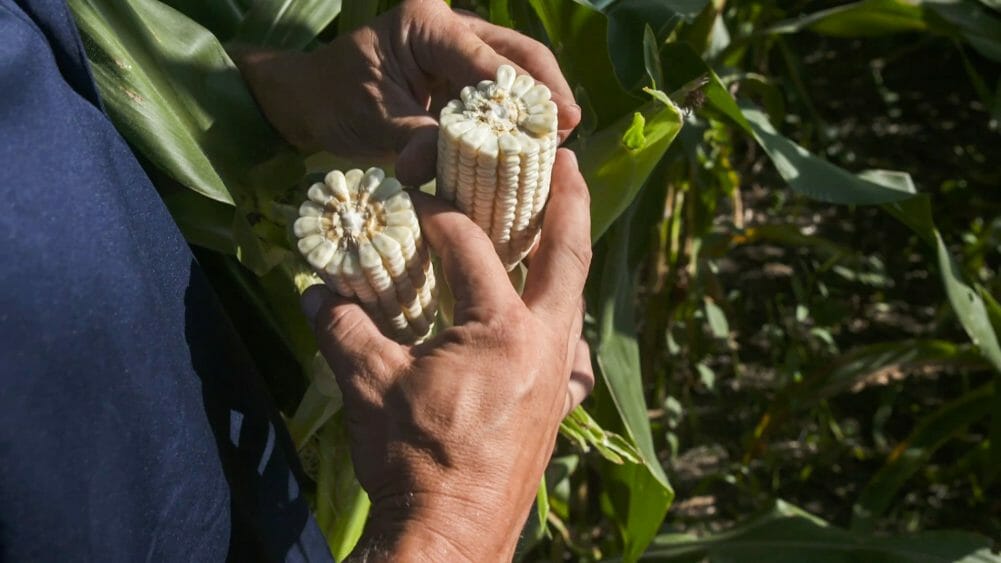Agriculture has a big nitrogen problem. As farmers spread synthetic nitrogen fertilizer on fields, runoff carries it into adjacent waterways where it wreaks havoc on aquatic ecosystems. Algae thrives on the excess nitrogen leading to algal blooms that decrease oxygen levels in the water and create dead zones beneath the surface. A number of startups are hoping to help farmers reduce their reliance on nitrogen fertilizers in a multitude of ways. But, according to Pivot Bio, teeny, tiny microbes may hold the greatest potential.
“About half of the applied nitrogen today isn’t consumed by the crop; it ends up somewhere else whether that’s water or air pollution,” CEO of Pivot Bio Karsten Temme tells AFN. “The three biggest consumers of nitrogen are corn, wheat, and rice. That’s half the world’s nitrogen use.”
The Berkeley, CA-based startup has today announced the closing of a $100 million Series C round co-led by return investors Breakthrough Energy Ventures, the $1 billion billionaire-backed fund focused on accelerating the world’s transition to clean energy, and Singapore state fund Temasek. DCVC also participated in the round. The round brings Pivot’s total capital raise to $186 million. This marks the second largest funding for a microbe-focused agri-foodtech startup (excluding Indigo Ag, which pivoted into other channels.) In 2016, microbe engineering startup Zymergen raised a $130 million Series B. Competing microbial discovery startup Ginkgo Bioworks raised a $100 million Series C round earlier that same year.
The new funding will help the company scale its microbial nitrogen technology that promises to help farmers boost crop yield. Its flagship product, Pivot Bio PROVEN, fixates nitrogen from the atmosphere and secretes it at the corn crop’s root zone to be used when the plant needs it.
In its second year of commercialization, the product recently sold out. It’s used on hundreds of thousands of acres in the US corn belt, according to Pivot Bio. The new round of funding will also be used to help the startup expand its market internationally. Pivot Bio PROVEN will soon be available to Argentinian corn farmers, and through IN10T’s FarmerTrials, Pivot Bio will launch Intent to Pivot on-farm corn trials for Canadian growers. Earlier this spring, the company launched its inaugural product for U.S. wheat crops, Pivot Bio RETURN, through a limited, early-adopter program.
As one of the first players in the ag microbe space, Pivot Bio has survived a lot of skepticism around whether bio-based inputs can offer farmers the same efficacy as chemical inputs but with fewer environmental harms. Temme says what sets his startup apart from others in the space, however, is long-standing science.
“In our case, things are different because the mechanism of nitrogen fixation through microbes breathing in the air and turning it into something plants can use has been understood for 125 years,” Temme explains. “I think every grower we talked to has been told by parents and grandparents that this happens when growing beans. What’s been missing is a technical way to make what happens in legumes happen for other cereal and grain crops.”
Instead of skirting the skepticism, Pivot Bio has seemingly tackled it head-on. One of the primary criticisms against microbes is their fragility. Temperature controlled environments and time sensitivities mean farmers can’t exactly leave microbial-based products lingering at the back of the shop for too long. In March 2019, Pivot Bio partnered with 3Bar Biologics to combine PROVEN with 3Bar’s delivery system that allows a farmer to cultivate a fresh batch of microbes right on the farm.
The new sizeable Series C funding will likely help silence some microbial naysayers and help the bio-based crop input segment settle into firmer footing in the agrifood tech world. If there is any remaining doubt, one only has to glance at what major ag chem companies are doing in the realm of microscopic bacteria to understand the potential that they hold. One example is Bayer, which was an early investor in Pivot Bio’s Series A in 2017 before it created a joint venture with microbe-farming group Ginkgo Bioworks called Joyn Bio to find microbes that might also reduce the need for nitrogen fertilizer. Bayer recently obtained worldwide exclusive distribution rights to AlphaBio Control’s bioinsecticide called Flipper that is reportedly safe for pollinators, as well.
Although Pivot Bio doesn’t appear to be having many problems convincing farmers to give its product a shot, some producers sit on the fence when it comes to whether paying PROVEN’s premium price point will be worthwhile. Pivot Bio did not give us specific cost-saving figures but did say that its product uses significantly less energy than the manufacturing of synthetic fertilizer, eliminates 99.5% of greenhouse gas emissions during its production, and is delivered through regular shipping carriers eliminating the costly infrastructure of factories, pipelines, barges, and storage at brick-and-mortar retail locations.
It also estimates that if farmers adopted PROVEN on 35% of US corn acres, it could reduce or prevent nearly 20,000 metric tons of nitrous oxide emissions. This is equivalent to taking roughly 1.5 million cars off the road by its account. It may also prevent up to 500,000 metric tons of nitrates from leaching into waterways.
“The biggest driver of the environmental footprint in ag ties back to the use of nitrogen fertilizer. Because we are entirely reinventing that with a product that doesn’t have the same negative environmental impacts, we are the biggest driver for any sustainability benefit tied to agriculture. The majority of any sustainability benefit in ag will be linked back to using our product,” Temme explains. “I think there is a great hand-in-hand potential relationship on how we interact with marketplaces that enable our grower base to better capitalize on benefits and practices while ultimately unlock some new potential revenue streams in ag that haven’t been there before.”





